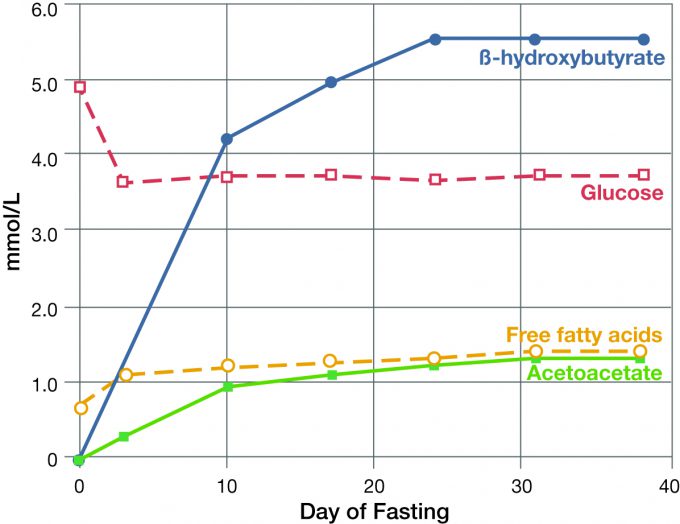|
Wouldn’t it be nice to live in a world where the answers to all our health questions were black and white, (“Eat this, and you will feel good; don’t eat this, or you will not feel good”)? Unfortunately, health is not black and white, and often we have to navigate through the grey areas to find the truth. MYTH #1: A ketogenic diet increases your risk for cardiovascular diseaseThis myth is centred around the misinformation that saturated fat and cholesterol are the main causes of heart disease. Despite being shown that dietary cholesterol does not raise blood cholesterol1 and saturated fat has little correlation to heart disease,2 there is still a stigma around both. Cardiovascular risk does not boil down to a single biomarker, but rather encompasses a host of factors such as age, sex, total cholesterol, high-density lipoprotein (HDL) cholesterol, triglycerides, smoking, blood pressure, glycemic control, and more. Several of these risk factors may be mitigated by lifestyle changes. Low-density lipoprotein (LDL) cholesterol, as opposed to high-density lipoprotein (HDL) cholesterol, often gets a bad rap because the general understanding about cholesterol is that LDL cholesterol is the “bad” cholesterol, and HDL cholesterol is the “good” cholesterol. While this isn’t entirely misleading, what is misleading is referring to these as absolutes. LDL is usually misrepresented as the single factor that determines one’s risk for cardiovascular disease (CVD), when in fact there is more to the LDL and CVD risk story much of which is still uncovered. The danger lies with the small, dense LDL particles (as opposed to large, buoyant LDL particles),3 which have been shown to be associated with CVD.4 It is not uncommon to see a rise in total LDL levels when following a ketogenic diet. Recently published results of a one-year study of patients on a well-formulated ketogenic diet showed that the ketogenic diet did not change total LDL particle numbers but rather caused a shift toward an increase in large, buoyant LDL particles and decrease in small, dense LDL particles,5 which is a good thing! With all of this said, there is still a lot that is not fully understood about LDL cholesterol in the context of a ketogenic diet. As previously stated, LDL is not the only biomarker to consider when determining risk for CVD. Working with a keto-savvy physician is recommended when considering a ketogenic diet. When part of a weight management program including exercise and lifestyle modifications, the ketogenic diet can actually improve other biomarkers of CVD risk, such as weight,6 HDL cholesterol,6 blood pressure,5 blood levels of saturated fat,7 HbA1c,5 inflammation,8 and more! In fact, research has shown that carbohydrate-rich diets pose more of a health risk than ketogenic diets. High-carbohydrate diets have been associated with increases in small, dense LDL particles and reductions in HDL cholesterol along with raised triacylglycerol levels, all of which contribute to increased CVD risk.9 MYTH #2: The human body requires carbohydrates to survive This one may be hard to wrap your head around considering there are actually some cell types that do have an absolute requirement for glucose and cannot use fats or ketones for fuel, such as red blood cells which lack mitochondria, the organelle required for ketone utilization. Dr. George Cahill, former professor at Harvard Medical School, studied human body fuel metabolism under prolonged starvation, pioneering the understanding of ketones as an alternative fuel source to glucose. His research demonstrated that even after 40 days of fasting, glucose levels in the participants were maintained, despite consuming no food (Figure 1).10 So where does the glucose come from to fuel these cells when carbohydrates are restricted, such as with a ketogenic diet? Once you are keto-adapted (i.e. in a state of sustained nutritional ketosis), there are two primary sources that contribute to glucose maintenance. The first is from amino acids via a process called gluconeogenesis, where certain gluconeogenic amino acids are broken down into glucose. These amino acids can come from the protein consumed or stored in muscles. However, when ketones are circulating in our blood and the brain begins preferentially using ketones for the fuel, glucose requirements are reduced, therefore the need to break down muscle is reduced. This is one way ketones are muscle-sparing. The second source of glucose is from the glycerol backbone of triglycerides. Triglycerides are the storage form of fat and contain one glycerol backbone attached to three fatty acids. When the body breaks down stored fat while in ketosis, the fatty acids are detached from this glycerol molecule to make ketones, and the glycerol molecule can be converted into glucose, accounting for most of the body’s glucose requirements when keto-adapted. Figure 1: Circulating concentrations of βOHB, glucose, free fatty acids, and acetoacetate in obese but otherwise normal man fasting for 40 days. Adapted from Cahill GF et al. Ketoacids? Good medicine? Transactions of the American Clinical and Climatological Association. 2003;114:149-163.
MYTH #3: Nutritional ketosis puts you at risk for ketoacidosis This is one of the most common myths, and despite being proven wrong time and again, people still want to believe that the ketogenic diet causes ketoacidosis. Ketoacidosis is a valid concern given that it can be a life-threatening event where ketone bodies cause a dangerous imbalance in blood pH. However, this condition occurs primarily in those with type-1 diabetes or insulin-dependent type-2 diabetes, and is uncommon in healthy individuals with a fully functioning pancreas. Blood ketone levels are regulated by insulin, just as blood glucose is. When ketones reach their upper limit (~7-8mmol/L), a small amount of insulin is released from the pancreas to help prevent any further elevation in blood ketones, this system is designed to help the body avoid what is considered ketoacidosis (~15-25mmol/L). Nutritional ketosis (i.e. ketosis achieved via a ketogenic diet) is highly unlikely to put a healthy person at risk of reaching dangerous ketone levels. There are rare exceptions to this where ketoacidosis can occur in those adhering to a ketogenic diet in instances such as dehydration, sickness, and possibly pregnancy. However, it is always advised to start a diet and/or weight management program under the supervision of a physician or healthcare provider. MYTH #4: You can’t do keto as a vegan or vegetarian The ketogenic diet is commonly associated with a diet primarily composed of animal fats. However, nowhere is it stated that to follow a ketogenic diet, solely animal fats are required. There are plenty of plant-based fat sources that are highly suitable for a ketogenic diet such as avocados, nuts and seeds, olives, etc., and their oil derivatives. For those people who are vegetarian (but not vegan), the options extend even further to include eggs and dairy, both excellent sources of fats. Incorporating oils will likely be necessary for those following a completely plant-based ketogenic diet, as it would be very difficult to fulfil the macronutrient ratios needed to enter ketosis by utilizing only whole foods. This recent post outlines different types of dietary fats that may be used on ketogenic diet, as many of the sources mentioned in the post are plant-based. There are many low-carbohydrate vegetables that should also be included in a ketogenic diet regardless of whether animal products are part of dietary intake. These primarily include leafy greens, cruciferous vegetables, lettuces, celery, cucumber, and zucchini. There are also many dairy-free alternatives to dairy fats such as nut milks, full-fat coconut milk, nut-based yogurts, and nut-based cheeses, all unsweetened of course! MYTH #5: The ketogenic diet is the same as a low-carb diet Many people begin their ketogenic diet by cutting out carbohydrates and replacing those calories with protein-based foods. Those who are used to restricting dietary fats may approach a ketogenic diet and foods with hesitation. A ketogenic diet is a high-fat, moderate-protein, very low-carbohydrate diet. So, while you may be under the allotted daily grams of carbohydrates, the amount of fats and proteins consumed must be considered as well. Fats contain ~9 calories per gram, while protein and carbohydrates contain ~4 calories per gram. Given this information, portion sizes will likely be reduced when following a ketogenic diet, and this may be more of a psychological barrier than a satiety one. Adding additional fats to meals in the form of oil, butter, ghee, or full-fat dairy can transform a low-carbohydrate meal into a ketogenic meal. Consider adding quality fats to protein sources to slow the digestion of protein and attenuate any glucose/insulin responses that could potentially prevent one from “entering” or “kicking out” out of ketosis. If you are not entering ketosis following what you believe to be a ketogenic diet, void of almost all carbohydrates, you may be over consuming protein. In this case, adjust your macro nutrients to include higher quantities of dietary fats and less low-fat protein sources. Resources:
Disclaimer: This content is not intended as a substitute for professional medical advice, diagnosis, or treatment. Individuals should always consult with their healthcare professional for advice on medical issues. Submitted by the Metagenics Marketing Team
3 Comments
amanda
2/8/2023 06:26:57 pm
Had been an obese person from childhood, and lost self-confidence due to that, but recently after following a keto diet, I started losing weight, and it worked wonders for me.The primary goal of the keto diet is to shift the body's metabolism from relying on carbohydrates for energy to using fats and ketones as its primary fuel source. By significantly reducing carbohydrate intake and increasing fat consumption, the body enters a state called ketosis, where it burns fat for energy.After researching a lot and going through lots of reviews just tried this keto cookbook and surprisingly the menus turned out to be delicious and helped me loose weight also. No medicines, no expensive consultation and the best part is THE BOOK IS COMPLETLY FREE , just shipping charges. I can make food according to my choice and loose weight also. I LOST 46 Lbs IN 5 MONTHS. Really happy with the product.Take control of your weight today - <a href="https://www.digistore24.com/redir/269221/akash9016/" target="_blank">click here</a> to order and experience a new level of confidence!
Reply
Nandy
4/8/2023 10:02:00 am
Say goodbye to the weight that's been holding you back! This incredible product helped me drop from 105kg to a fit 65kg. <a href="https://www.digistore24.com/redir/411008/Narendra79/" target="_blank">click here</a> to embark on your journey towards a healthier lifestyle!
Reply
Jessie
26/10/2023 11:09:39 am
Struggling with excess weight was tough, but this remarkable product made it easier. From 120kg to a healthy 70kg, I feel more energized and confident than ever. <a href="https://e8085jvhv-a2br7yzd6kcwek7e.hop.clickbank.net" target="_blank">click here</a> to transform your weight and health!
Reply
Leave a Reply. |
Categories
All
Archives
April 2024
|
|
Join Our Community
|
|
Amipro Disclaimer:
Certain persons, considered experts, may disagree with one or more of the foregoing statements, but the same are deemed, nevertheless, to be based on sound and reliable authority. No such statements shall be construed as a claim or representation as to Metagenics products, that they are offered for the diagnosis, cure, mitigation, treatment or prevention of any disease. |




 RSS Feed
RSS Feed